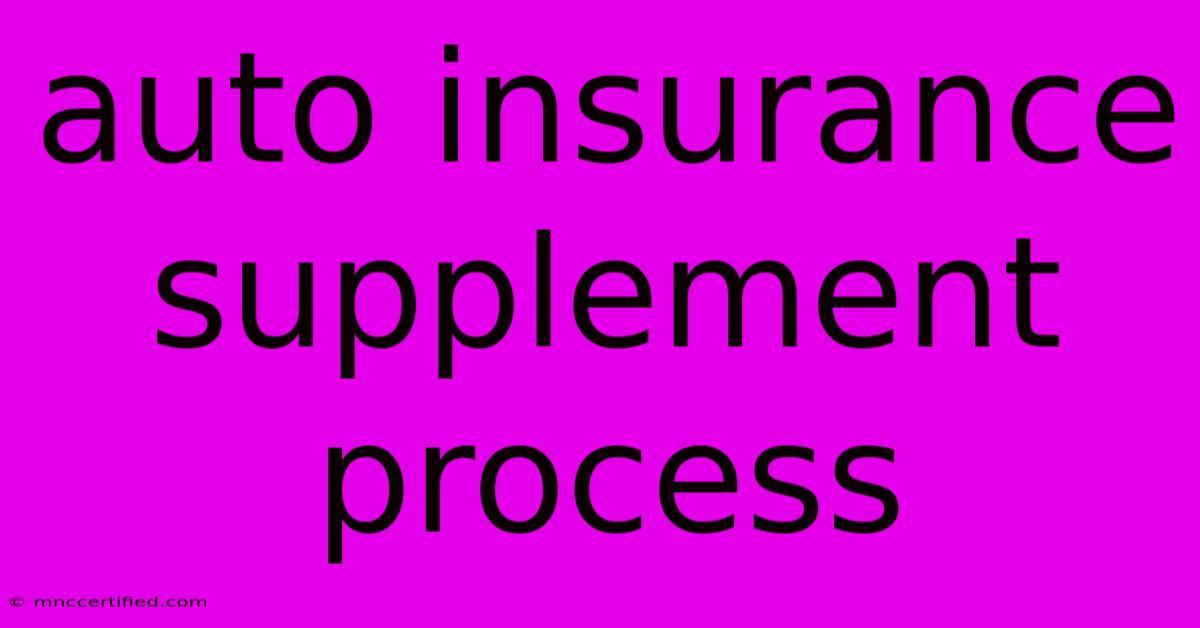Auto Insurance Supplement Process

Table of Contents
Auto Insurance Supplement Process: A Comprehensive Guide
Are you facing a situation where your auto insurance payout isn't enough to cover all your damages after an accident? Understanding the auto insurance supplement process can be crucial in ensuring you receive the full compensation you deserve. This comprehensive guide will walk you through each step, helping you navigate the often-complex process of supplementing your auto insurance claim.
Understanding Your Policy's Limits
Before delving into the supplement process, it's vital to understand your auto insurance policy's coverage limits. Your policy likely specifies limits for bodily injury liability, property damage liability, uninsured/underinsured motorist (UM/UIM) coverage, and collision/comprehensive coverage. Knowing these limits is the first step in determining if you need supplemental coverage. If your damages exceed these limits, you'll need to explore options to supplement your claim.
Common Scenarios Requiring Supplements
Several situations frequently necessitate supplementing your auto insurance claim:
- Significant Medical Bills: Medical expenses following a serious accident can quickly escalate, often surpassing the bodily injury liability limits of a standard policy.
- Extensive Vehicle Damage: Repair costs for a severely damaged vehicle can easily exceed the collision coverage limit. This is particularly true for newer or luxury vehicles.
- Lost Wages: If your injuries prevent you from working, you might need supplemental coverage to compensate for lost income.
- Pain and Suffering: Depending on the severity of your injuries, you may be entitled to compensation for pain and suffering, which isn't always fully covered by standard policies.
- Uninsured/Underinsured Motorist Claims: If you were injured by an uninsured or underinsured driver, your UM/UIM coverage might not be sufficient to cover all your losses.
Steps in the Auto Insurance Supplement Process
The process of supplementing your auto insurance claim can vary depending on your insurance company and the specifics of your case. However, the general steps typically include:
-
File a Claim: Begin by filing a comprehensive claim with your insurance company, providing all relevant documentation, including police reports, medical records, repair estimates, and photos of the damage.
-
Negotiate with Your Insurer: Once your initial claim is processed, you'll likely receive an initial payout. If this payout is insufficient, you need to negotiate with your insurance adjuster. Clearly outline all your expenses and losses, providing supporting documentation.
-
Explore Other Avenues: If negotiations with your insurance company prove unsuccessful, you might need to explore other avenues for supplemental coverage:
- Health Insurance: Your health insurance may cover some or all of your medical expenses.
- Disability Insurance: If you have disability insurance, it might cover a portion of your lost wages.
- Uninsured/Underinsured Motorist Coverage: If applicable, pursue a claim under your UM/UIM coverage.
- Legal Action: In some cases, filing a lawsuit against the at-fault driver or their insurance company might be necessary to obtain full compensation. Consulting with a personal injury attorney is crucial in these situations.
-
Document Everything: Throughout the entire process, meticulously document all communication, expenses, and interactions with your insurance company and other involved parties. This documentation will be essential if you need to pursue further legal action.
Tips for a Smooth Supplement Process
- Act Quickly: The sooner you begin the process, the better. Delays can complicate the process and make it harder to obtain full compensation.
- Gather All Necessary Documentation: Having all relevant documentation readily available will expedite the claims process.
- Understand Your Policy: Thoroughly review your insurance policy to understand your coverage limits and exclusions.
- Communicate Clearly: Maintain open and clear communication with your insurance company and any legal representatives.
- Seek Professional Help: Don't hesitate to consult with a personal injury attorney if you're struggling to navigate the process or if your claim is complex.
Supplementing your auto insurance claim can be a challenging but necessary process. By understanding the steps involved and taking proactive measures, you can significantly increase your chances of receiving the full compensation you deserve. Remember to always thoroughly read your policy and keep detailed records. Taking these steps can help ease the financial burden after a car accident.

Thank you for visiting our website wich cover about Auto Insurance Supplement Process. We hope the information provided has been useful to you. Feel free to contact us if you have any questions or need further assistance. See you next time and dont miss to bookmark.
Featured Posts
-
21000 Philippine Pesos To Dollars
Nov 18, 2024
-
Hennion And Walsh Municipal Bonds
Nov 18, 2024
-
Ravens Vs Steelers Preview 3 Focus Areas
Nov 18, 2024
-
I M A Celebrity 2024 Dates And Duration
Nov 18, 2024
-
Live England Vs Ireland Nations League Result
Nov 18, 2024